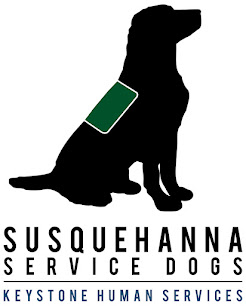House manners are one of the most important things our puppy
raisers teach our dogs. When a dog has good house manners, they have many more
options for where they can be placed. Poor house manners, on the other hand,
can get a dog completely discharged from our program.
Although our trainers see the dogs in puppy classes and
outings and work with the dogs in advanced training, they don’t often get to
the see the dogs at home. That’s why it’s so important for our puppy raisers to
teach good house manners.
What traits are we
ultimately looking for in our service dogs?
- Adaptable. Our service dogs must be adaptable. We’re looking for dogs that can easily relax in almost any situation or environment.
- Confident. Service dogs need to have enough confidence that they don’t get scared by adaptive equipment, a person who walks with a different gait, or even someone wearing a sweatshirt with the hood up. Their future partners may use crutches or an adaptive communication device, and the dogs must have the confidence to perform their tasks and behaviors.
- Friendly. We’re looking for dogs that are friendly and like people and other animals, but we don’t want dogs that are unusually friendly. A dog that gets so excited to greet people that it jumps up or pulls away from its partner may not be a successful service dog.
- Easy to live with. The purpose of a service dog is to make its partner’s life easier and give the person more independence. The partner shouldn’t have to adapt their life to the dogs’ needs. Rather, the dog should fit almost seamlessly into its partner’s life. “Easy to live with” means the dog is housebroken, potties on cue on and off leash, stays off furniture and the bed, is quiet, waits at doors, saves rough dog play for outside, can stay at home alone uncrated for at least two hours, and lives nicely with dogs and cats.
- Polite. Finally, our dogs must be polite, meaning they respect people’s belongings and their space. For example, the dog shouldn’t chew its partner’s shoes or couch.
Teaching good house manners starts from day one. Practiced
behaviors become learned behaviors. If you start right away and you’re
consistent, your dog will most likely learn lovely house manners. Try to use
great management and clicker training to only teach good behaviors, but it a
behavior does slip through the cracks, such as countersurfing, fix it right
away. Don’t just ignore the behavior and hope it goes away.
If you need to address a behavior, use appropriate
punishment for inappropriate behaviors. For example, if a dog jumps on the
couch without permission, simply use its collar to guide the dog off. Once the
dog has all four paws on the floor, you can invite the dog back on the couch if
they ask politely. Asking politely can be sitting or resting its head on the
couch or in your lap. You can then choose to invite the dog up on the couch.
Please note that SSD does not approve of painful punishment
or anything more than a mild verbal correction or mild physical pressure, such
as guiding the dog by the collar or moving into the dog’s space.
Over the next few weeks, we will post our expectations for
different behaviors around the house, as well as some tips for training them.
Although these expectations and tips apply to our service dogs and are often
stricter than the expectations for pets, these tips may also come in handy for
training your pets.
Visit us again next week for tips on training your dog not
to jump on people. This could be especially handy if you’re planning to have
guests over for the holidays!










No comments:
Post a Comment